2 Volumes
Constitutional Era
American history between the Revolution and the approach of the Civil War, was dominated by the Constitutional Convention in Philadelphia in 1787. Background rumbling was from the French Revolution. The War of 1812 was merely an embarrassment.
Worldwide Common Currency and Corporate Headquarters
The Death of Money
Improving Our Political System
Republics and their Flaws
Addressing the Flaws of Republics
EVERYONE might profit from reading Plato on the subject of republics, not to mention reading James Madison. Both The Republic and The Federalist were conjuring republics they proposed, not ones they had experienced. After Madison did get the hands-on experience he had such radical changes of opinion his friend George Washington essentially never spoke to him again. Not only in republics, of course, does reality prove different from founding theory. It might seem more measured to say of republics that two centuries of their reality proves to be such an extension of theory, it effectively departs from it. In essence, the Republican idea is to limit the voters to one periodic review of their representative's term of office overall, not in ongoing picky detail which would hamper him. This definition contrasts republics with democracies and implies the reason to favor republics. The elected representative is given full power to act during his term in office, but must eventually face the voters for accounting at the fixed time for re-election. Plato and Madison were right about extending latitude to one's chosen representative, but they failed to predict how effectively that latitude might be stolen by the legislative body itself and controlled by rules and leadership which skirt ratification by the general public outside their chamber, in any district. The Romans, of course, did know what they were talking about, but history has tended to ascribe Roman difficulties -- assassinations, for example -- to flaws in Roman character rather than in the construction of the Roman Republic. After describing some problems history has revealed about our own system, this essay is written to propose a solution. A second essay follows, to defend that solution.
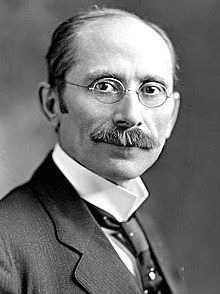
|
| Joseph L Bristow |
The differences between House and Senate in the original U.S. Constitution were three, but since the Seventeenth Amendment in 1913, there are now only two. Originally, Senators were selected by the states they came from, mostly by the legislatures. A century of experience demonstrated the result was cronyism, members of the legislature using senatorial appointments as bargaining chips and for the most part limiting the choice to one of their own members. The provision probably did attract a higher grade of legislator overall, encouraging those primarily ambitious to be U.S. senators to have a try-out in the minor leagues first. It did give the State government serious power to punish a U.S. senator who failed to please the home state. And this selection process made it simpler and cheaper to run for the job as U.S. senator. This feature encouraged candidates with competing for career choices, otherwise discouraged by the expense and unpleasantness of candidacy, to step forward. But by 1913 all this was seen as a way for cronyism to dominate the process, swapping appointments for favors, or even more tangible bribes. From the distance of another century, it can be seen that the steadily declining power of state legislatures was matched by a declining quality of their elected membership, leading to a rising level of sordidness in their foibles. Hapless amateurs were largely supplanted by career politicians. After the Civil War "states rights" stirred up memories of secession and led to a deliberate weakening of the states' role. Whatever the reasoning, the mentality of Progressivism was sweeping the country in 1913, and popular election of senators was deemed a Good Thing, swept into general satisfaction. Doubt about whether it all made as much difference as claimed lies in the reality that from 1913 to 2010, one quarter (182) of all Senators have first arrived in the Senate through appointment by a Governor to fill an unexpired vacancy. Many of these vacancies have of course been contrived for the purpose.
The relative power of a senator and a representative lies in the size of the population who vote for them, and the frequency with which they must endure that unpleasantness. Members of the House are elected for two years and members of the Senate are elected for six; the voting constituency of 100 Senators is generally much larger than that of 532 Representatives, so because the population grows faster than the number of states, the representation discrepancy also grows. The frequency of running for reelection seems to be so irksome that whenever a Senate seat falls vacant, some sitting Congressman from that state is almost certain to try to switch. Of course, it is true that with only a quarter as many senators as congressmen, the power of each vote is weightier. To the extent that committee memberships represent special insider power, a senator does belong to more committees but is more severely stretched to attend them all. Each senator's vote does have a greater scarcity value, but a Representative who tends to business is more likely to know what he is talking about, hence better able to be influential in the committees where most matters are really decided. The limits of merit promotion in both houses of Congress lie in the differing power of various committees, while the favor of appointment remains within the iron control of caucus leadership. In public, senators seem generally more polished and experienced in public persuasion. The persuasion that counts, however, is of gaining the respect of colleagues in your own legislative body, always restrained by the power of leadership to coerce conformity. Public persuasiveness, by contrast, is often little more than glibness, reflecting greater experience with dodging an issue to conceal a lack of depth in it. Almost all senators aspire to the presidency, although few achieve it. No Congressman has been elected President since Warren Harding; indeed, few Congressmen even dare to seek the nomination. The appointment of Gerald Ford was a special situation. However, it is worth pondering that during the early days of the republic, the House of Representatives was considered much more prestigious than the Senate, and that curiosity continues to raise an important question just why it is now reversed.

|
| George Washington |
The differences in prestige between the House and the Senate cannot be ascribed to the comparatively minor differences in their Constitutional definition, the size of their district and the frequency of election. Otherwise, we could immediately improve the quality of congressmen by reducing the limit of their number and frequency of re-election, which scarcely anyone has proposed. The more likely source of the problem can be found in the differing rules of procedure which each body has adopted; and reaffirms at the opening of each term. Various strategies of committee assignment and seniority have adapted to the reality that newly elected politicians rarely have any skills other than the ability to get elected. But almost everyone can learn, given enough time being exposed to a topic. A seniority system can occasionally lead to someone who is hopeless, gradually floating into a position where he can do great harm. Provision must be made for graceful exceptions to the seniority rule, usually by excluding a member from important committees until he has demonstrated some competence, less often by later dropping someone who has age- or alcohol-diminished faculties. Underlying this approach is a contempt bred of experience for the wisdom of the voters, back there in the district, whereas the leaders of the fraternity can protect the nation by judiciously devised rules. Sometimes it is, unfortunately, necessary to be a little hard boiled.
So far so good. When Jefferson and Martin Van Buren invented political parties, the bodies of Congress responded by inventing caucuses. George Washington was not a learned man, but he knew he hated this system. James Madison probably feared political parties more than he hated them, so he incurred Washington's permanent displeasure by getting good at manipulating what he saw as the winning strategy. Van Buren's fate was more ironic; after inventing many of the unpleasant little strategies of modern politics, he was defeated by William Henry Harrison in the "log cabin" election of 1840. Harrison hadn't been born in a log cabin at all, he was born in a Virginia mansion, hee, hee, hee. George Washington wouldn't have chuckled at that one, he would have been livid.
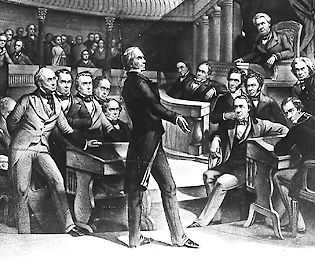
|
| Henry Clay |
Party caucuses have only one central feature, which is vote-swapping. Many of the strategies of this unattractive behavior were outlined in elegant detail by Pliny the Younger, in the Roman Senate, and James Madison the student of government had sought to avoid them. When he decided it was hopeless, he joined them and got good at it. In retrospect, the premier example of vote-swapping was the trade which Madison and Hamilton made, placing the nation's capital in Virginia/Maryland instead of Philadelphia, in return for federally redeeming the Revolutionary debts for all 13 states, when Virginians had already paid theirs off. Philadelphia had essentially nothing to say about it. Pliny had cautioned and subsequent practitioners have followed the advice to cover your tracks by swapping votes for an issue seemingly unrelated to the one in dispute. That's about all there is to vote-swapping, find out what the guy wants badly enough, and trade him something for it. It follows that it's wise to give off the appearance that you don't want much of anything. A corollary is that political caucuses try to conduct even innocent or public-spirited discussions in secret, making public only what is expedient to be made public. And a further corollary: some members of a caucus are from totally "safe" districts. Occasionally their votes can safely be traded for something the opposing party wants but the caucus feels necessary to claim to oppose. When a caucus wants something badly enough to trade it for something else but is three or four votes short, the opposing caucus may trade the four votes from safe districts while violently denouncing the dirty turncoats. All this is known as party loyalty. When things are particularly tough, party loyalty can be enforced by finding out what you want badly and taking it away from you. When these whips are applied to you, a grievance develops. Fine, what do you want to trade in return for vengeance? Many of these refinements seem to come, not from Rome, but from Sicily.
As was stated at the beginning, the purpose of this essay is not to rail at Congressional corruption, but to counteract it to some degree. Since the worst features of this system require secrecy and public duplicity to be effective, the best remedy is sunshine. Not about what Roosevelt did in his third term, but about what your local congressman might do next week, and his fear you will find out. His fear that a blogger will tip off the local newspaper or radio station, encouraging someone else with the ambition to file for election against you. And his fear that when he asks someone for a campaign contribution, that person will bring up the topic in question. His fear that the local political boss will decide he can't win.
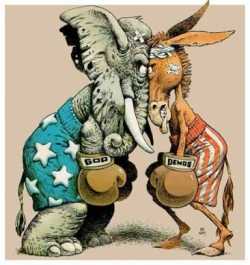
|
| Boxing Politicians |
This was more or less the system which the founding fathers, James Madison chief among them, envisioned for this shining city on a hill. And which two centuries of rather clever schemers have gradually eroded. The highly desirable feature of a republic is that the elected person is free to represent his own interpretation of what is best for his district or, failing that, what is best for the nation. The elected representative is encouraged to risk defeat in the next election, if in his judgment what is good for the district is bad for the nation. But he is not a suicide bomber if his vote will make little difference in the outcome he can be forgiven for taking cover. One would wish that fewer of them would speak one way and vote in the opposite direction, but that can be forgiven if someone back home in the district is keeping score and letting others know of it. The fundamental principle of a republic as distinguished from a pure democracy is that a representative, while free to act during his term in office, remains obliged to face the voters at the appointed time. Our system has come to exaggerate the actual extent of freedom to use judgment because the freedom has been stolen by party leaders through the application of schemes too devious to detail. But freedom is fundamentally a good thing. What has come to be so lacking is the idea of facing an informed electorate in making a choice between you and an informed opponent. The public, it must be feared, doesn't know beans.
And so the proposal for fixing this mess is difficult, but it can be stated simply. The recent economic boom created nearly a thousand billionaires; maybe four hundred would be a number that would escape challenge. If only fifty of them would endow think tanks in all fifty state capitals, and the fifty-first would endow an organization dedicated to making their research available to the public, then perhaps another fifty would be prompted to create a second think tank in each state capital on the opposite political side. Two polarized think tanks in each state capital, just imagine it. As things now stand, it would be a sufficient first step if that happened in only one state, and the rest of the country could watch what happens.
Void for Vagueness

|
| Question Mark |
BECAUSE otherwise, everyone would plead ignorance, ignorance of the law has been dismissed as a defense for thousands of years. What, then, is the situation when the statute itself is accused? Here, a group of citizens accuses the government of enacting vague laws, conceivably with the malicious intent to give government officers a free hand. Only the U.S. Supreme Court may decide Constitutional issues, and nine Justices are certainly inadequate to cope with a huge vagueness project. The Court must at least define a method for coping with imprecision. What is to be done with this?
 Is it really any longer true that ignorance of the law is no excuse? 
|
This novel proposition is a recent one, mostly because the volume of laws has steadily grown since 1787, when we began the Republic without any statutes at all, to the present gargantuan size of the Federal, State and Local Codes requiring hundreds of feet of shelf space in a library. No human brain can contain all that information at once, not even to mention the interpretive Regulations which grow by hundreds of thousands of pages each year. The limits of practical governance by traditional methods have passed the point where ignorance of the law is a theory, it is an absolute certainty for every citizen in most situations. Is it thus really any longer true that ignorance of the law is no excuse? Perhaps modern computer search capability has advanced to the point where it can conquer this problem for judges in an appellate situation, but woe unto the financier or automobile driver who professes ignorance of the state of judicial dispute resting in the system. Sometime relatively soon, some legal genius must figure out a sensible, workable, way to reconsider the rule that ignorance is no excuse when plainly anything other than ignorance is a laughable pretense.
But this muddle is only a background for a new twist to the same issue. The synthetic process has now created a growing apprehension that duly elected officials have passed laws which are deliberately vague, forcing the country to surrender decisions to a tyrannical process. Leave motive and intent out of the discussion; a tyrant is being created whether a tyrant seeks the crown or not. Just review recent history.

|
| Lame Duck |
We now grow accustomed to seeing proposed legislation thousands of pages long, appearing on the desks of elected congressmen who have been given a day or two, or sometimes less than a day, to approve them. The authors of this proposed legislation are often quite unidentifiable, and might sometimes not even be officials of the government. For a while, there was some talk of appointing "Czars" for certain areas of activity, but this has apparently provoked too much Congressional resistance. These multi-thousand page bills appear out of nowhere in particular, nominally authorized by the Speaker, the Committee Chairman, or some other official of Congress whose freedom of action is actually tightly controlled by arcane but irresistible partisan politics. A legislative body pretending that every member is the equal of every other, is in fact ruled with an iron hand.
Elected representatives of the people, charged with writing our laws, who even happen to belong to the majority political party, are powerless to refuse to adopt the legislation they have not read, and the minority is even more dismissively ignored. Confounding even careful reading of small sections of these bills, they are vague, potentially intentionally so. There is scant opportunity afforded legislators to question the authors of these legislative piles, not even the opportunity to have them reveal their names. Subscribe to this mystery package, or suffer unspoken political punishments. We are told assurances are privately given there will be an opportunity to correct errors when regulations are written by the Executive branch. The Legislative branch effectively removed itself from the expenditure of a trillion dollars for a medical reform that no one could lucidly explain, affecting a sixth of the gross domestic product. Within a month, this "reform" was followed by a highly similar process directed at the financial system of the nation, which likewise bears almost no resemblance to the problems it claims prompted the action. Small wonder the countryside is dotted with Tea Parties, and small wonder they are confused by what they want. Chief among their objectives is a demand to return to an understandable system, controlled by the legislative branch, not the executive one.
Whether the applicable term is "vagueness" or whether an underlying motive is to be alleged by calling it "deliberate ambiguity", a former Justice of the U.S. Supreme Court once supplied an adequate slogan for these legal barricades. Justice George Sutherland, who sat on the court from 1922 to 1938, constructed the legal standard for the unconstitutionality of criminal cases called Void for Vagueness . It seems a sufficiently evocative slogan for fall election campaigns, and it might even serve as a legal claim in a Supreme Court test of the matter.
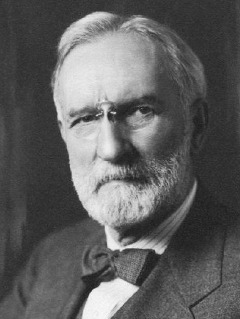
|
Meanwhile, we have wars to fight, and the deepest recession in eighty years, plus whatever events national or international news may force us to contend with. A monumental Supreme Court test seems an almost welcome alternative. To make it possible, the Court will have to resolve the difficulty that this issue is neither criminal nor civil in the usual sense, and there is no third alternative. Furthermore, there is the picky-picky quibble that the doctrine of "void for vagueness" has only previously been used in criminal cases. We will have to endure the Republican resurrection of George Sutherland as a former American Bar President, whose elevation to the Supreme Court was so anticipated by everyone that he was unanimously confirmed, without hearings, the day he was nominated.
The fact is, popping the bubble of "void for vagueness" in this particular political tap dance is only an early warning that the nation is already inundated in a sea of bewildering rules. To the point where ignorance of the law must be acknowledged to be the common fate of all citizens. The law must soon address the matter, uncharacteristically remembering that the first step in resolving any true crisis is to decide which rule must be broken.
Declaration of Rights of the Continental Congress, October 14, 1774
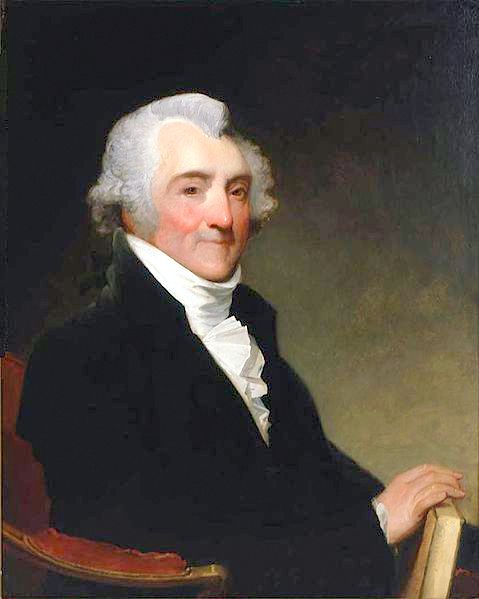
|
| John Sulllivan |
Whereas, since the close of the last war, the British Parliament, claiming a power of right to bind the people of America, by statute, all cases whatsoever, hath in some acts expressly imposed taxes on them and in others, under various pretenses, but in fact for the purpose raising a revenue, hath imposed rates and duties payable in these colonies established a board of commissioners, with unconstitutional powers, and extended the jurisdiction of courts of admiralty, not only for collecting the said duties but for the trial of causes merely arising within the body of a county.
And whereas, in consequence of other statutes, judges, who before held only estates at will in their offices, have been made dependent on the Crown alone for their salaries, and standing armies kept in time of peace:
And whereas it has lately been resolved in Parliament, that by force of a statute, made in the thirty-fifth year of the reign of Henry the Eighth, colonists may be transported to England, and tried there upon accusations for treasons, and misprisions, or concealments of treasons committed in the colonies, and by a late statute, such trials have been directed in cases therein mentioned.
And whereas, in the last session of Parliament, three statutes were made; one, entitled "An act to discontinue, in such manner and for such time as are therein mentioned, the landing and discharging, lading, or shipping of goods, wares, and merchandise, at the town, and within the harbor of Boston, in the province of Massachusetts Bay, in North America"; and another, entitled "An act for the better regulating the government of the province of the Massachusetts Bay in New England"; and another, entitled "An act for the impartial administration of justice, in the cases of persons questioned for any act done by them in the execution of the law, or for the suppression of riots and tumults in the province of the Massachusetts Bay, in New England." And another statute was then made, "for making more effectual provision for the government of the province of Quebec, etc." All which statutes are impolitic, unjust and cruel, as well as unconstitutional, and most dangerous and destructive of American rights.
And whereas, assemblies have been frequently dissolved, contrary to the rights of the people, when they attempted to deliberate on grievances; and their dutiful, humble, loyal, and reasonable petitions to the Crown for redress, have been repeatedly treated with contempt by His Majesty's ministers of state:
The good people of the several colonies of New Hampshire, Massachusetts Bay, Rhode Island and Providence Plantations, Connecticut, New York, New Jersey, Pennsylvania, New Castle, Kent and Sussex on Delaware, Maryland, Virginia, North Carolina, and South Carolina, justly alarmed at these arbitrary proceedings of Parliament and administration, have severally elected, constituted, and appointed deputies to meet and sit in general congress, in the city of Philadelphia, in order to obtain such establishment, as that their religion, laws, and liberties may not be subverted.
Whereupon the deputies so appointed being now assembled, in a full and free representation of these colonies, taking into their most serious consideration, the best means of attaining the ends aforesaid, do, in the first place, as Englishmen, their ancestors in like cases have usually done, for asserting and vindicating their rights and liberties, declare, That the inhabitants of the English colonies in North America, by the immutable laws of nature, the principles of the English Constitution, and the several charters or compacts, have the following rights:
Resolved, N. C. D. [Nemine contradicente, no person disagreeing]1. That they are entitled to life, liberty, and property, and they have never ceded to any sovereign power whatever, a right to dispose of either without their consent
Resolved, N. C. D. 2. That our ancestors, who first settled these colonies, were at the time of their emigration from the mother country, entitled to all the rights, liberties, and immunities of free and natural-born subjects, within the realm of England.
Resolved, N. C. D. 3. That by such emigration they by no means forfeited, surrendered, or lost any of those rights, but that they were, and their descendants now are, entitled to the exercise and enjoyment of all such of them, as their local and other circumstances enable them, to exercise and enjoy.
Resolved, 4. That the foundation of English liberty, and of all free government, is a right in the people to participate in their legislative council: and as the English colonists are not represented, and from their local and other circumstances, can not properly be represented in the British Parliament, they are entitled to a free and exclusive power of legislation in their several provincial legislatures, where their right of representation can alone be preserved, in all cases of taxation and internal polity, subject only to the negative of their sovereign, in such manner as has been heretofore used and accustomed. But, from the necessity of the case, and a regard to the mutual interest of both countries, we cheerfully consent to the operation of such acts of the British Parliament, as are bona fide, restrained to the regulation of our external commerce, for the purpose of securing the commercial advantages of the whole empire to the mother country, and the commercial benefits of its respective members; excluding every idea of taxation, internal or external, for raising a revenue on the subjects in America, without their consent.
Resolved, N. C. D. 5. That the respective colonies are entitled to the common law of England, and more especially to the great and inestimable privilege of being tried by their peers of the vicinage, according to the course of that law.
Resolved, N. C. D. 6. That they are entitled to the benefit of such of the English statutes as existed at the time of their colonization; and which they have, by experience, respectively found to be applicable to their several local and other circumstances.
Resolved, N. C. D. 7. That these, His Majesty's colonies, are likewise entitled to all the immunities and privileges granted and confirmed to them by royal charters, or secured by their several codes of provincial laws.
Resolved, N. C. D. 8. That they have a right peaceably to assemble, consider of their grievances, and petition the King; and that all prosecutions, prohibitory proclamations, and commitment for the same, are illegal.
Resolved, N. C. D. 9. That the keeping a standing army in these colonies, in times of peace, without the consent of the legislature of that colony, in which such army is kept, is against law.
Resolved, N. C. D. 10. It is indispensably necessary to good government, and rendered essential by the English constitution, that the constituent branches of the legislature be independent of each other; that, therefore, the exercise of legislative power in several colonies, by a council appointed, during pleasure by the Crown, is unconstitutional, dangerous, and destructive to the freedom of American legislation.
All and each of which the aforesaid deputies, in behalf of themselves and their constituents, do claim, demand, and insist on, as their indubitable rights and liberties; which cannot be legally taken from them, altered or abridged by any power whatever, without their own consent, by their representatives in their several provincial legislatures.
[Author: John Sulllivan, Delegate and later Governor, New Hampshire]
REFERENCES
| A Familiar Exposition of the Constitution of the United States: Containing a Brief Commentary on Every Clause, Explaining the True Nature, Reasons, and ... Designed for the Use of School Libraries and General Readers; Joseph Story: ISBN-13: 978-1886363717 | Amazon |
Sanctity of Contracts
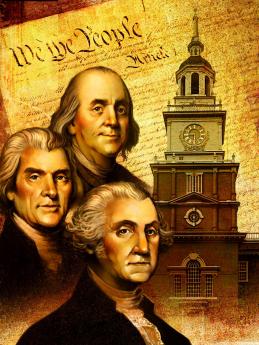
|
| Constitution |
THERE is little doubt many state legislatures behaved in a capricious and high-handed way in the twenty years prior to the 1787 Constitution. Outrage at this behavior was one of the important stimulants to writing the Constitution, as well as putting public pressure on state legislatures to ratify it in 1788. Section 10 of Article 1 is devoted to limitations on state behavior deemed to be generally offensive or otherwise contrary to the national interest. Among the comparatively short list of absolute prohibitions is found "No state shall......, pass any law.....impairing the obligation of contracts, or grant any title of nobility." This section condemns certain behavior as indefensible but does not specify the Federal government to be similarly limited, along with the states. However, the government which was established as one of the limited federal powers. Unless a power was specifically granted to the Federal government, the Tenth Amendment announces it belongs to the states, or, as the Ninth Amendment would have it, to the people. There seemed no need to limit the scope of a power which could not exist. The Tenth and final Amendment in the Bill of Rights ended the 1791 Constitution with the words:
X. The powers not delegated to the United States by the Constitution, nor prohibited by it to the states, are reserved to the States respectively, or to the people.
A modern capsulation might be: the Federal Government is no more empowered to impair the sanctity of contracts than it is to grant titles of nobility.
The Framers of the Constitution were inexperienced in the habits of a republic, or they might have anticipated the general tendency of those who are empowered to enforce the law, to flout it in their own behavior. Around the smallest courthouse in the nation, one need not be surprised to find the Sheriff or other local worthies, parking their cars in illegal spots without fear of punishment. It is not just state legislatures who are tempted to disobey the laws they pass, but a general tendency of all authority to do so. It requires a local citizenry with a very short fuse, displaying instant hostility to the first sign of this sort of swaggering, to keep their local newspapers from filling up with scandal stories in the weeks before an election. Many of these stories are politically motivated, of course, but it must be admitted that in a naughty world, they are necessary.
 No State shall enter into any Treaty, Alliance, or Confederation; grant Letters of Marque and Reprisal; coin Money; emit Bills of Credit; make any Thing but gold and silver Coin a Tender in Payment of Debts; pass any Bill of Attainder, ex post facto Law, or Law impairing the Obligation of Contracts, or grant any Title of Nobility. No State shall, without the Consent of the Congress, lay any Imposts or Duties on Imports or Exports, except what may be absolutely necessary for executing it's inspection Laws: and the net Produce of all Duties and Imposts, laid by any State on Imports or Exports, shall be for the Use of the Treasury of the United States; and all such Laws shall be subject to the Revision and Control of the Congress. No State shall, without the Consent of Congress, lay any duty of Tonnage, keep Troops, or Ships of War in time of Peace, enter into any Agreement or Compact with another State, or with a foreign Power, or engage in War, unless actually invaded, or in such imminent Danger as will not admit of delay. 
|
| Article One, Section 10 |
A 21st Century illustration is found in a letter sent to current beneficiaries of Social Security, reducing their monthly check by twenty or more percent in some cases, and in other cases just a few dollars. The notice says that this deduction is based on IRS reports of the individual's income, using material supplied by the Internal Revenue Service, thereby triggering an additional side question about the right of the government to use supposedly private information to impair the obligation of the Social Security contract. Setting the privacy issue aside, what is illustrated is an even more discouraging violation of the expectations for fair dealing. This is a privacy right which might have been enforced by an excruciating repetition of the time-consuming requirement of manual specification. Now that computers are more common, what formerly needed no specification, now perhaps begins to need it, since endless repetition is now so tediously conventional.
Governments casually violate the sanctity of contracts when it is self-serving to do so, and presumably, it can be shown that they neglect to violate, or even punish those who violate, whenever such violations are to the advantage of anyone else. It has been said that this matter has been adjudicated in favor of the government in the past, thus creating a precedent, stare decisis, so to speak. Whatever the logic of such precedents, growing Constitutional literacy among the public is going to demand that the matter be re-argued. That is to say, it is comparatively easy to imagine growing knowledge about the Constitution among the citizens, while it will never be easy to expect the public to puzzle through the steps in a judicial chain which explicates how the reverse is now a superior view. Therefore, the demand for re-argument should be a growing one.
National Debt, Presidential Hat Tricks, Shale Gas and Argentina
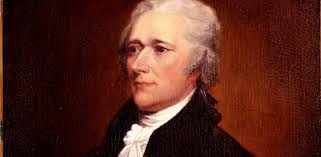
|
| Alexander Hamilton |
This-here speaker at the Right Angle Club began a discussion of the "Fiscal Cliff" razzle-dazzle of 2012, by changing his mind about the causes of the financial crash of 2007. Originally, it seemed as though globalizing 500 million Chinese out of poverty had destabilized the exuberant American mortgage market by flooding it with cheap credit. Supplanting that idea, or perhaps only supplementing it, must now be added the overextension of national debt itself to a point of bringing national borrowing to a halt.
Early in the Eighteenth century the Dutch and English had monetized national assets through a system of national borrowing formalized by Necker in Europe, and Robert Morris and Alexander Hamilton in America. Aside from a handful, no one could understand what they were talking about. Try reading that sentence a second time.
It amounted to guaranteeing all the private credit in the banking, investment, and commerce systems, with a national debt (in the form of Treasury bonds) which monetized all the assets of the whole nation. That action more or less doubled their value, just as any bank loan is seemingly owned by two people at the same time. Carried to an extreme, it might imply that America could turn Guam and Hawaii over to China if we defaulted on our debt. That was never actually intended to happen, and it never has, because all nations now fear the deflation which could result from triggering a massive exchange of national assets. The nebulous issue of "National Sovereignty" interferes with territorial transfers by any means other than war. If one nation defaults against a second nation which is afraid to go to war, it is just the stronger nation's hard luck about the debts it has chosen to support unless a transfer of assets actually happens. The Treaty of Versailles did transfer assets to the victors, and set off World War II, although it is considered bad manners to mention it. That's a simplified view of our international financial system, which admittedly skirts uncertainty about how much national debt is too much.
In fact, no one knows how much is too much until everyone runs for the exits. Now that politicians have control of computers and "big data", a modern description places the blame on Alan Greenspan the former Chairman of the Federal Reserve. For eighteen years Greenspan produced delicious world prosperity by steadily increasing American national debt faster than the American economy was growing. Sooner or later this approach was going to uncover how much was currently too much Federal debt. With silver and gold removed from the equation, one could see that default would certainly loom whenever the size of the debt became so large it could never be serviced by the Gross Domestic Product (GDP), and possibly sooner than that, if enough people could guess what was coming. This reality might be obscured temporarily by reducing interest rates, modifying international trade balances, and inflation. When the stars were in alignment however, the system just had to collapse and start over. Because it happened gradually, perhaps it would unwind gradually. In 2007 what happened was that everybody tried to get out the door at the same time. Essentially, our two political parties made opposite assessments: the party of Hamilton -- Republicans -- announced this system was doomed, while Democrats --the party of Andrew Jackson -- announced they could stave off disaster by making the rich Republicans pay for it. Both parties were partly right but essentially wrong, and the Democrats hired a better magician.
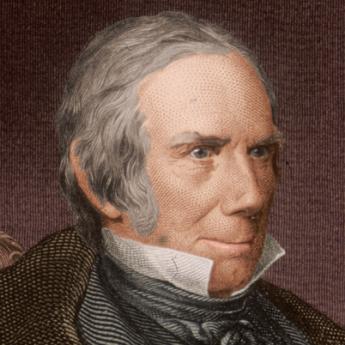
|
| Henry Clay |
It will take months or even years to be certain just what strategy was pursued. It would appear the Democrats chose to repeat the performance of the Obamacare legislation, eliminating national debate by eliminating the Congressional committee system of examining details in advance of a vote. Given one day to digest two thousand pages prepared by the Executive branch, no time was allowed for public opinion to form about Obamacare. In the case of the fiscal cliff episode, Congress was given less than one day to consider 150 pages allegedly prepared the day prior to the vote. Some will admire the skill of the executive branch in orchestrating this secret maneuver, but eventually, it must become apparent that policy decisions have been transferred from the legislative to the executive branch of government. Perhaps the Congressional Republicans are as stupid as the Democrats portray them to be, but it is also possible that a decision has been made to tempt the Democratic leaders into repeating this performance several times until eventually, the public is ready to consider impeachment for it. No matter what the strategy, we are now threatened with imagining some moment when gun barrels come level and live rounds slide home. We may pass up the opportunity to criticize Henry Clay for concentrating undue power in the Speaker of the House, or to uncover the way Harry Reid was persuaded to surrender Senate power to the Executive; both miscalculations are fast becoming irrelevant in the flurry of events. We came close to borrowing too much, exceeding our means to pay it back, that's all. A New York Times editorial economist feels we can "grow" our way out of this flirtation with danger, and we all certainly hope so.
Seemingly, there are only two ways to cope with over-borrowing, once we step over the invisible line. A nation may cheat its citizens with inflation, or it may cheat foreign citizens by defaulting on their currency. We are indebted to Rogoff and Reinhart for pointing out there is no difference between inflation and default except the identity of the cheated creditor; so most politicians prefer to cheat foreigners. Either way, cheating makes deadly enemies. Two centuries ago, Alexander Hamilton suggested a third way out of the problem, which we would today call "growth". But here, cheating is pretty easy: If the limit is some ratio of debt to GDP, find a way to increase nominal GDP.
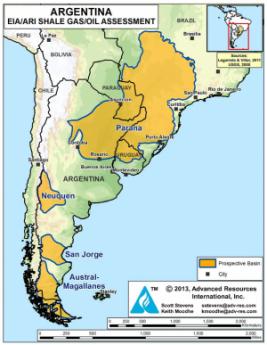
|
| Shale Gas and Argentina |
The most astonishing current example of the power of "growth", is shale gas. It may not be totally clean, but it is cleaner than oil or coal, and far cheaper. We suddenly have so much of it the price of energy is artificially lowered, and we talk, not merely of energy independence, but of restoring the balance of international payments by exporting it. Germany is constructing steel mills to utilize iron ingots made in America with gas instead of coal. Pittsburgh was once the center of steel production because that's where the coal was, the most expensive ingredient to transport. Suddenly it is now apparently cheaper to transport the energy source to wherever you find limestone and iron ore. JP Morgan got rich the other way, transporting limestone and iron ore to Pittsburgh, where the coal was. Russia now finds it has lost its leverage over Eastern Europe's energy supply, and the Arabs (?Iranians?) will no longer have a monopoly to provide the wealth supporting Middle-Eastern mischief. China may lose interest in Africa. And in America we may develop the courage to rid ourselves of the corn subsidies for gasoline; cutting the wind and sunlight fumbles also emerge as obvious ways to cut the deficit. That's what we mean by growth. It's so powerful it makes action by any American President seem trivial by comparison.
Presumably, President Obama does not welcome being upstaged by an economic force he doggedly resisted. He may seek ways to imply it was his idea all along. When that happens, rest assured that everyone else is then a fracker. But there is another alternative Presidential path, which in extreme form is emerging in Argentina without much media attention. In short, Argentina discovered signs of oil deposits but was unable to exploit them. A European oil company was enticed to develop the oil reserves at its own expense, and effectively did so in expectation of reward from the resulting oil sales. Suddenly, the Kirchner government expropriated the oil company, paying for it with Argentine bonds. The ink was scarcely dry before the Argentine government abruptly turned around and offered to buy back the bonds for 24 cents on the dollar. And unless someone is willing to send gunboats, the previous owners of the oil company are just out of luck. Appeals to the UN are futile; because on the one-nation, one-vote principle, there are more expropriator votes in the UN than potential victims. The only thing visible which could save capitalism in South America from the revolution in shale gas competition. Presumably, Argentina has lots of shale gas, but who will lend them the money to frack it?
Implicit Powers of the Federal Government
<The two highest achievements of James Madison, had been and still remain, the writing of the Bill of Rights, and acting as a close collaborator with George Washington in fleshing out the role of the President in the new government. The Ninth and Tenth Amendments made it clear that the federal government was to be constrained to a limited and enumerated set of powers, while all other activities belonged to the states. This was already clear enough in the main text of the Constitution, which Madison also dominated after close consultation with Washington before the Constitutional Convention. So he had battled and successfully negotiated one matter twice, before the most powerful and distinguished assemblies in the nation. As to the second matter, circumstances had promoted a shy young bookworm into the role of preceptor to the most famous man in America. In the earliest days of the new republic, certainly during the first year of it, Washington and Madison worked closely together in defining the role of the Presidency.
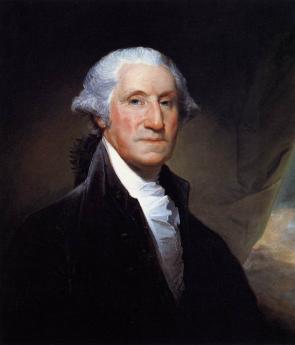
|
| George Washington |
During the first weeks of that exploratory period, Washington induced Congress to create a cabinet and the first four cabinet positions, even though the Constitution did not mention cabinets. It all was explained as an "implicit power", inherently necessary for the functioning of the Executive branch. Soon afterward, Alexander Hamilton as Secretary of the Treasury proposed the creation of a national bank. Madison and his lifelong friend Thomas Jefferson were bitterly opposed, using the argument that creating banks was not one of the enumerated powers granted by the Constitution. Hamilton's reply was that creating a bank was an "implicit power" since it was necessary for running the federal government. Of course, Hamilton and Jefferson both had other unspoken motives for their position: for and against promoting urban vs. rural power, for and against the industrialization of the national economy, and dominating the states in matters of currency and financial leadership. It empowered a national rather than a confederated economy.
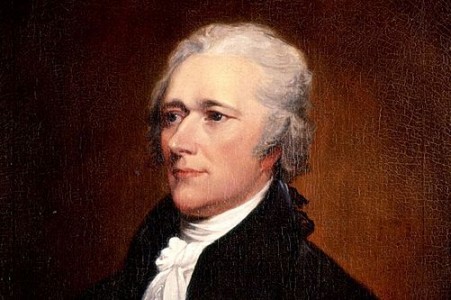
|
| Alexander Hamilton |
For Madison, the legalism probably carried considerably more weight than it did for Jefferson and Hamilton because it demonstrated the enduring consequences of being vague about the boundaries of any constitutional restriction. If this loophole got firmly established, it might reduce the whole federal system to a laughingstock. In order to promote the "general welfare", anything at all could be called an implicit power, and both separation of powers and enumerating federal powers would soon become quaint flourishes. The whole Constitution might fall apart in endless debates. On a personal level, Madison's highest achievements would have to be supplanted by something more practical. Besides which, Madison was a Virginian, a rich slave-holding farmer, and a young politician, seemingly on the verge of a promising career which might easily lead to the presidency for himself. Hamilton his most visible opponent, was already proposing a tax on whiskey which would almost surely antagonize farmers to the west, and assuming the Revolutionary debts of the states was equally divisive.

|
| Mt. Vernon |
As matters eventually worked out, the main disputants made ostensible constitutional arguments, while the real political dispute would be settled by a political deal struck at a dinner. It traded relocation of the national capital to Virginia, for the assumption of the debts of all states (when Virginia had already paid off its debt.) Location of the capitol opposite George Washington's home at Mt. Vernon also took care of difficulties coming from that direction. By the time the uproar about this arrangement subsided, the precedent for settling the inherent conflict between enforcing Constitutional limitations versus enlarging their boundaries had been set. The most opportune time for stricter interpretation was fading while the most likely advocates of it were restrained by their own example. The negotiation was a little unseemly, and probably encouraged similar decisions to migrate to a less conflicted body, which eventually John Marshall would define as the U.S. Supreme Court.
History Writing and History Teaching
The conventional pattern of testing history students sounds a lot like the pattern of writing history. Daily or weekly quizzes, followed by tests at the end of subject material, followed in turn by final examinations of a whole course; it all sounds like blogs for events, chapters for topics, and books for an overall subject, as we have earlier proposed as the pattern for publishing history. It would probably be an endless argument as to whether teaching is patterned after authorship or the other way around since nowadays most books of history are written by professors who are paid to teach. Furthermore, every lecturer quickly learns how organizing a lecture and responding to questions will sharpen the insights of authorship. Those who pursue two trades simultaneously will usually adopt similar patterns for both, regardless of which is the primary source of income.
There is one difference, however. Ever since von Ranke made footnotes and primary source material the essential hallmarks of historical scholarship, academic history has acquired a certain rigor which talking to an audience of late teenagers does not encourage, may even discourage. Professors with long hair and blue jeans are attempting to merge with the audience, and those who promote them are wise to withhold tenure until it is established that standards are being met, particularly in grade inflation. There is even an undercurrent to the repeated complaint that publication is being overvalued by comparison with teaching skill. In an unmonitored classroom, it can be difficult to know whether presentations are politically neutral, fact-based and restrained. Publications and citations can at least be judged by those standards. But that may be the least of it.
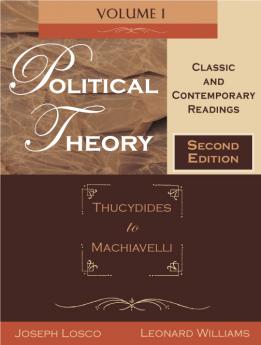
|
| Thucydides and Machiavelli |
History to a large extent is based on secondary and tertiary sources, and what the student retains is a summation of filtered interpretations. From what the students learn, the culture learns, possibly filtered again by graduates who have become columnists and anchormen. Professors are a vital link in society's chain of opinion formation, eventually reaching the politician who raises his hand to vote in a legislative body. Whether that politician is responding to the myth of George Washington and the cherry tree or to the generalizations of Thucydides and Machiavelli -- makes a difference, even though George Washington makes a better role model than Machiavelli. The point is that academic lectures cannot easily employ footnotes to primary sources, as secondary sources regularly are expected to do. And they are only one example of several sources of community opinion which could profit from lessening the doubts of their critics.
REFERENCES
| Political Theory Classic and Contemporary Readings, Vol. 1: Thucydides to Machiavelli: Joseph Losco (Editor), Leonard A. Williams (Editor): ISBN: 978-1891487910 | Amazon |
Running for the Assembly, Only in Philadelpia
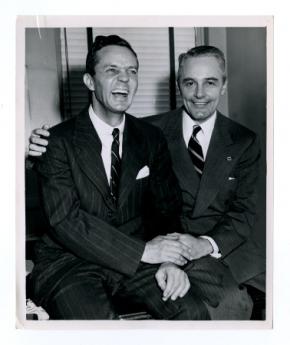
|
| Joseph Clark and Richardson Dilworth |
When I had to confess my defeat (by 5%) at a local club in Philadelphia that I belong to, I had to tell the group why I had been running for the Assembly. Finally, one friend with a puzzled look asked, "I never heard of running for election to the Assembly. I always thought membership was inherited."
Another friend had to tell him that it wasn't that Assembly, with dancing and all, it was the political one in New Jersey.
Only in Philadelphia, could you imagine such a conversation.
Minimum Wage Fangdoodle
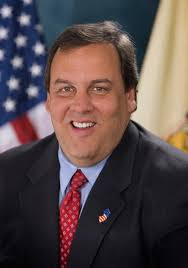
|
| Governor Chris Christie |
The November 2013 elections have been widely accepted to be a spectacular win for New Jersey Governor Chris Christie, suddenly making him a presidential front-runner for 2016. The only other significant election was a close win in the Virginia gubernatorial race for a fund-raising crony of Bill Clinton over the Attorney General who started the Supreme Court Case over Obamacare. In the view of the news media, there were only two elections in this off-year -- a landslide in New Jersey, and a dead heat in Virginia, for Governor.
Well, as a matter of fact, there was also an election in New Jersey for all of the members of the legislature, which means that I was running against the Democratic majority leader in the 6th Legislative District. I got 19,000 votes, but I needed more to win. At least in my family, it was a big event, particularly since no one else in New Jersey contributed a dime to my campaign, and while Governor Christie may have whispered a few encouraging words to me, there was no evidence of his assistance. But you can forget about that, too, because this election was really about the minimum wage.
The first inkling I got that something was up was receiving a sample ballot, three days before the election, where there was a referendum question about the minimum wage that no one had told me about, although it could scarcely have been a secret to get it on the ballot. And secondly, on election day there was scarcely any evidence of campaigning for Democrat candidates except for a few yard signs, but literally, dozens of campaign workers poured into the subway stations, handing out great volumes of campaign literature about the minimum wage. Even that went past me unnoticed, because who in the world would vote for a proposal which would increase unemployment during a severe recession? When I expressed the same sentiment to my Democratic friends, I was surprised to discover they all knew about it in advance. In retrospect, that was a fairly good indication that the Internet had selectively urged support of this proposition to the party faithful, but had not said one word in campaigning for it. It won endorsement by a heavy margin, as things soon turned out. What's worse, what had been endorsed by referendum had been to amend the constitution to this effect, automatically indexing it to the cost of living. It's going to be pretty hard to reverse that since all constitutions have been written to make it very hard to amend them.
p> In the week after the election, I notice that several other states have been considering raising the minimum wage. An article appeared on the editorial page of the New York Times arguing that research showed there was no evidence that raising the minimum wage caused unemployment, and a few days later, Paul Krugman had a learned column on the Times editorial page to the effect that smart people all knew there was no reason to expect unemployment from raising the minimum wage, and only the hopelessly ignorant rubes would imagine there was reason to think so. Having spent some time with editorial writers, it seemed pretty evident to me that there was a nationally coordinated effort to convert this into a truism, accepted so widely it would be futile to argue against it. When it is also possible to see the existence of a campaign to impose a maximum wage (and not merely in Switzerland, where it was defeated on a ballot), the trajectory of a rising minimum wage meeting a falling maximum wage easily led to conjectures that what was really afoot was a campaign to take wages out of the marketplace. Or was that really the goal?
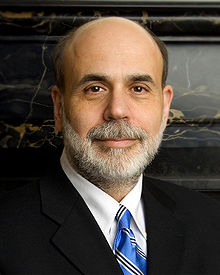
|
| Ben Bernanke |
For months, the Federal Reserve Chairman has been emphasizing that the Fed must obey two mandates: to maintain price stability and to minimize unemployment. Meanwhile, the dirty little secret among economists has been that unemployment is the main obstacle to inflation in the face of a massive enlargement of the money supply. Unemployment is currently at 7.1% and falling, while the Fed has lifted the veil of "transparency" to reveal it made a promise in double-speak to start selling some of the bonds it issued to combat the recession when unemployment reaches 6.5%. As time has gone on, Mr. Bernanke has seemed to back away from that promise. He is not so sure that unemployment is a good measure of unemployment, other measures may be a better measure of what we are driving at. He never meant to start selling bonds when unemployment reached 6.5%, he only meant that he might reduce the number he planned to buy. He never meant to make a promise, he only was being transparent about the current thinking of the Board. And anyway, Janet Yellen will take over his job in a month, so you can't very well bind your successor to do anything at all. What's this tap-dancing all about?
Well, it simply won't do, to suggest that the Federal Reserve isn't as independent of politics as it pretends to be. But everyone noticed that the stock market had a bad fainting spell when he suggested a few months ago that the Board had been discussing the matter; just imagine what it would do if he actually made a promise to act, let alone actually taking an action. By itself, such an announcement would probably send interest rates on a rise toward normal levels. The stock market mostly anticipates the future, so it would jump ahead of whatever action was taken. Since the United States is now the largest debtor on earth, a rise of interest rates would immediately add huge amounts to the current deficit and the projected national debt. The stock market would almost surely drop, possibly severely, in response to such commotion in the debt markets. And the national economy would certainly feel the deflationary effect of such activity in the financial markets, sending markets even lower. Fear of such a reaction would surely persist longer than the real need for monetary easing, making the resultant inflation even worse than it had to be.
 Is it possible the Obama Administration prefers a little extra unemployment, to risking a stock market crash before a coming election? 
|
| Minimum Wage Uproar |
In an era of desperate experimentation with the simultaneous solutions of several problems at once, perhaps the best conservative response to this paper is to seek ways to relax its inflexibility. The political process, particularly the amendment of state constitutions, is a lengthy and cumbersome impediment to agile management of the economy. It is fairly unlikely that a secret springing of a referendum trap can be repeated. The greater risk is that we will know what should be done, but become unable to do it quickly.
Meanwhile, the politicians are designing things and politicians like things simple. The Republican solution is to pass a minimum wage, but keep its benefit slightly below the entry-level wage; they get credit for passing it, but it has almost no applicability. The Democrat approach is to make a big noise about passing a meaningless bill, promising they will make it up with off the balance sheet entitlements, like health care and college tuition. Either way, usually nothing much happens after the election is over.
9 Blogs
Addressing the Flaws of Republics
 We need some local, not national, think tanks. To understand why, it helps to have been elected to something, yourself.
We need some local, not national, think tanks. To understand why, it helps to have been elected to something, yourself.
Void for Vagueness
 Ignorance of the law is no excuse, but what about a law that is deliberately vague?
Ignorance of the law is no excuse, but what about a law that is deliberately vague?
Declaration of Rights of the Continental Congress, October 14, 1774
 .
.
Sanctity of Contracts
 Article I of the Constitution, states in section10 that "No state shall......pass any law.....impairing the obligation of contracts, or grant any title of nobility." While the Constitution does not precisely say the Congress may not do so, or the President might not, it is definitely omitted from the list of limited federal powers. And it is the enduring expectation of the citizenry that the federal government is no more encouraged to impair the sanctity of contracts than to grant titles of nobility.
Article I of the Constitution, states in section10 that "No state shall......pass any law.....impairing the obligation of contracts, or grant any title of nobility." While the Constitution does not precisely say the Congress may not do so, or the President might not, it is definitely omitted from the list of limited federal powers. And it is the enduring expectation of the citizenry that the federal government is no more encouraged to impair the sanctity of contracts than to grant titles of nobility.
National Debt, Presidential Hat Tricks, Shale Gas and Argentina
 The Franklin Inn Club discusses Obama's maneuvers in the context of what might have been a better approach.
The Franklin Inn Club discusses Obama's maneuvers in the context of what might have been a better approach.
Implicit Powers of the Federal Government
 The Constitution strictly limited the number of federal powers, but did not define their boundaries. Intending to be flexible, it opened a permanent loophole.
The Constitution strictly limited the number of federal powers, but did not define their boundaries. Intending to be flexible, it opened a permanent loophole.
History Writing and History Teaching
 Teaching history is remarkably similar to writing history, at least in its pattern of construction. But there is one exception.
Teaching history is remarkably similar to writing history, at least in its pattern of construction. But there is one exception.
Running for the Assembly, Only in Philadelpia
 Except for Clarke and Dillworth, Philadelphia social leaders haven't had much to do with politics for a century.
Except for Clarke and Dillworth, Philadelphia social leaders haven't had much to do with politics for a century.
Minimum Wage Fangdoodle
 While no one was looking, mandating a minimum wage turned into a contrivance to maintain low-interest rates.
While no one was looking, mandating a minimum wage turned into a contrivance to maintain low-interest rates.